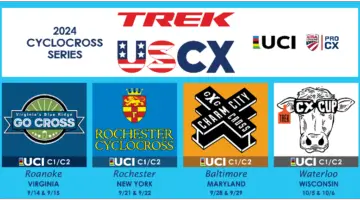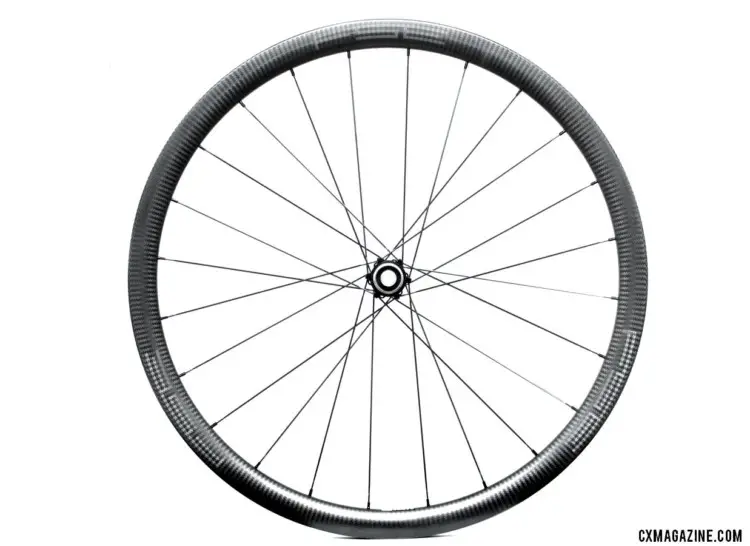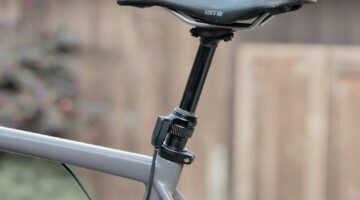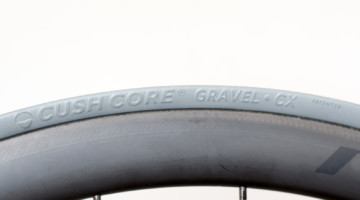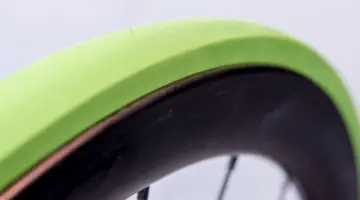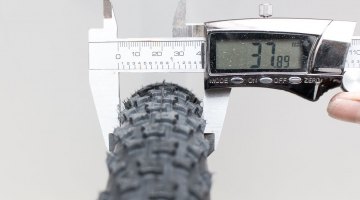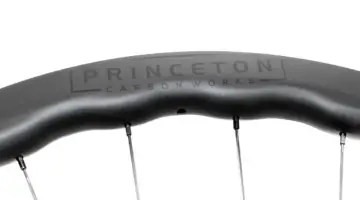FSE is a relative newcomer to the carbon wheel market. The company began in 2006 as an OEM and then started developing its FSE (Filament Spin Evolution) construction process three years ago as an alternative to composite rim manufacturing. The company officially launched its complete FSE product at Interbike in 2016. The company claims the process produces a stiffer and stronger carbon wheel than the traditional layup process, with higher quality and lower voids.
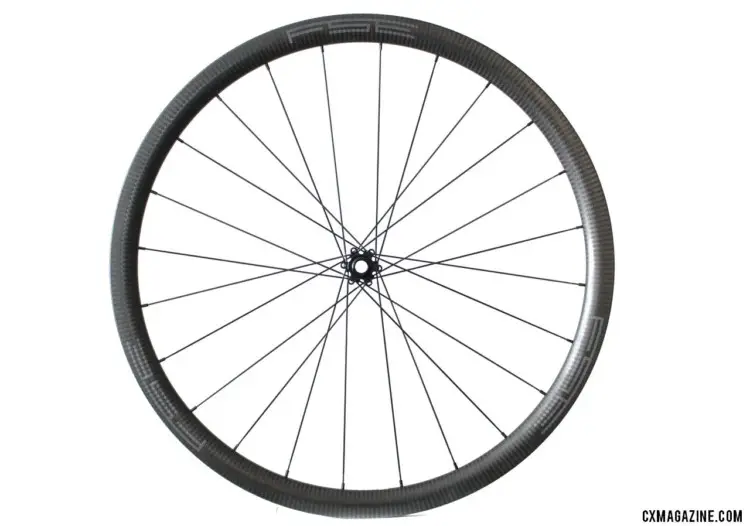
FSE (Filament Spin Evolution) EVO 35CD carbon tubeless clincher disc brake wheels. © Cyclocross Magazine
Never heard of FSE? Until recently, we hadn’t either, but the company is building awareness through Norm Alvis, one of its sponsored riders. The still-racing, former U.S. hour record holder, Grand Tour competitor and Pro Road National Champion is now dominating criteriums on the company’s wheels.
FSE Offers Options, Upgrades
If you like choices, then FSE’s wheels might be for you. It offers both tubular and clincher options for disc and rim brakes. The clinchers allow a choice between a tubeless-ready and standard rim bed and each comes either with or without spoke holes. The tubeless disc clinchers come in rim depths of 25 to 79mm.
Play with the company’s wheel customizer and you might get overwhelmed by the choices. You can choose from standard clincher, tubeless clincher and sealed tubeless clincher rim, and the choices impact pricing.
FSE sent Cyclocross Magazine a set of the EVO 35CD tubeless clincher disc wheels that we’re now testing. The rim is 35mm deep, and 18mm wide (internal).
Tubeless adds 40 grams per rim and $100 per wheelset. For cyclocross or gravel, we think that’s a no-brainer if you’re not glued to tubulars.
While FSE offers traditional rim drilling, it also offers fully sealed rim option that allows tubeless setup without tape. This option is available for a $100 upcharge and a 10 gram per wheel penalty.
Tubeless tape is cheap and some DIYers use strapping tape or Gorilla tape, so is such an option worth it? It’s a fair question, but if you’ve ever dealt with leaky tubeless tape or messed up your tubeless tape with a tire lever out on a ride, you might appreciate the security and convenience offered by the sealed rim. It will also save you a few grams over tape.
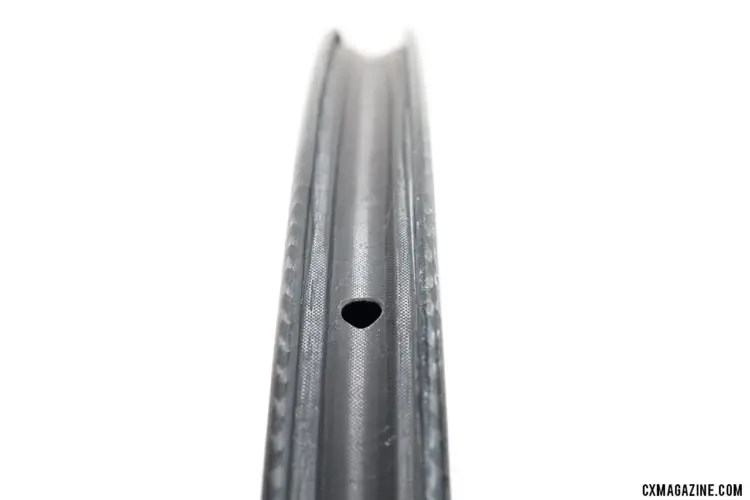
The valve hole is the only one in the rim bed, much like a UST rim. FSE (Filament Spin Evolution) EVO 35CD carbon tubeless clincher disc brake wheels. © Cyclocross Magazine
Trust the Process: Different Manufacturing
FSE has been working on rebuilding the way carbon rims are manufactured, and it’s taken the company almost as long as a storied Philadelphia franchise to reap the rewards of its construction process.
FSE, originally an OEM manufacturer, eschews the typical rim manufacturing process of laying up multiple sheets of prepreg carbon fiber by hand in a mold to create a carbon rim. Instead, the company uses a computer-controlled process to wind carbon filaments around a mandrel. This process is not new — it has been used to create pipes and tubes — and fork manufacturer Wound Up Composites uses it to manufacture its fork legs and carbon steerers. The company claims the end result is higher quality control, lower failure rates and a better stiffness-to-weight ratio.
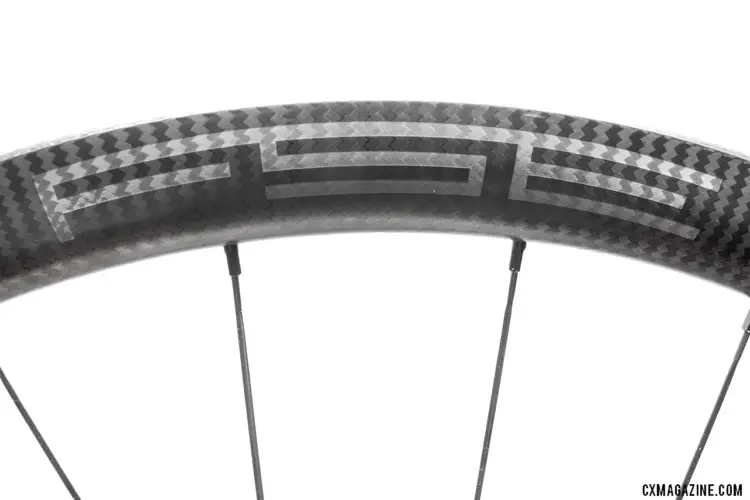
FSE (Filament Spin Evolution) EVO 35CD carbon tubeless clincher disc brake wheels, with its carbon weave finish, look different and according to the company, are built differently than most rims for better heat resistance, stiffness and weight savings. © Cyclocross Magazine
The process also contributes to a different aesthetic. The rims have a unique weave pattern that stands out among the more common unidirectional finish.
Stiffer and Lighter?
While FSE states its process results in a rim that is 40% lighter and 40% stiffer than other composite rims, the rim weight of the EVO 35CD wheels, at around 450g, is not earth-shattering. FSE’s Dan Kellerby says the company weighs each individual rim and the review wheels we’re riding feature a 453g front rim and 451g rear rim. Perhaps that means these rims may be more durable than rims of similar weight? Kellerby admits the 40% lighter claim is more applicable to the company’s road line, which features rims as light as 200g.
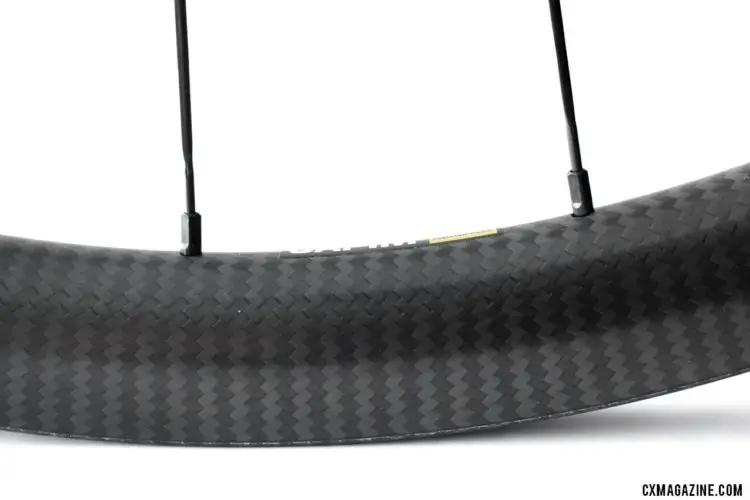
FSE uses Sapim Polyax nipples, which have rounded heads that Sapim claims creates a better exit line from the rim. FSE (Filament Spin Evolution) EVO 35CD carbon tubeless clincher disc brake wheels. © Cyclocross Magazine
To put those numbers into perspective, Stan’s Valor rims come in more than 100g lighter at a claimed 325g, and (now-defunct) American Classic’s alloy 29er MTB rims are also lighter at 350g. That’s in no way a fair apples-to-apples comparison, of course. The FSE rims can handle higher pressures (130 psi for a 25mm tire) than some other tubeless carbon rims (Stan’s Valor rim has a much lower pressure rating), and without the need for tape to seal the rim bed, you get a dozen grams or more back. There’s also much less risk of sealant accumulating over time inside the rim since there is no tape to fail and there are fewer potential entry points without spoke holes in the rim bed. While some alloy rims can be lighter, they can also dent quite easily, which can be problematic for maintaining an airtight tubeless seal.
Cyclists have many different reasons for upgrading their wheels — weight savings, reliability and durability are just a few of them. At 1,450g (actual) per set, the FSE wheels are quite light for disc brake wheels, but knowing the rim weights, it’s fair to say some of the weight savings are coming from the lightweight hubs. Compared to an OEM set of wheels, the EVO 35CD wheels could easily shed a pound or more off of a bike, some of which will still be rotating weight savings.
The Build
FSE laces its rims to its own branded hubs with 24 straight-pull Sapim CX-Ray spokes front and rear. FSE designs its hubs around 6-bolt rotors and uses interchangeable end caps to fit quick release and both 12 and 15mm thru-axle frames. Consumers select their desired axle type when purchasing the wheels, and additional end caps are available for $15. The company’s simple plugs/caps that convert a front hub from 15mm to 12mm are the best we’ve used and also happen to fit other hubs.
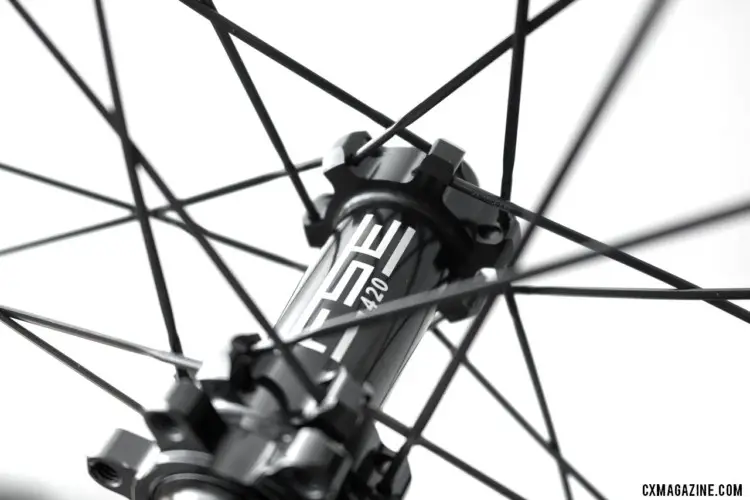
FSE uses a straight pull hub compatible with 6-bolt rotors. FSE (Filament Spin Evolution) EVO 35CD carbon tubeless clincher disc brake wheels. © Cyclocross Magazine
The 6-pawl freehub is available with both Shimano and Campagnolo splines, and it has a stainless steel bite guard similar to American Classic and Bitex hubs to prevent cassette splines from digging in over time. That’s a nice touch that you’ll appreciate whenever you need to swap cassettes.
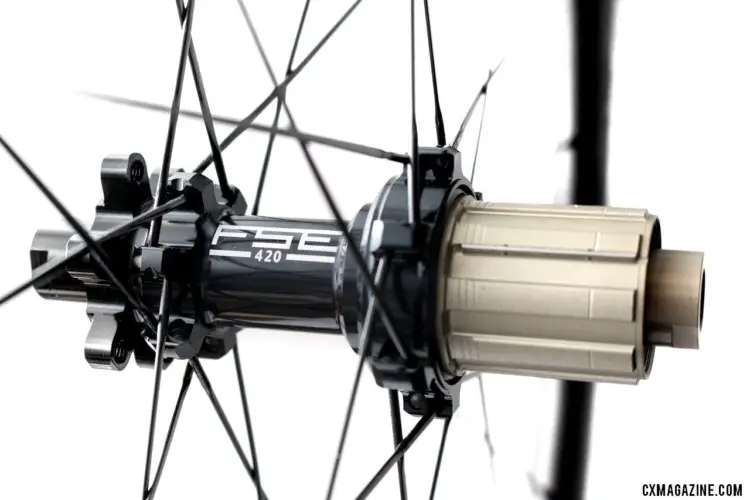
FSE’s disc hub is available with a Shimano/SRAM or Campagnolo freehub. FSE (Filament Spin Evolution) EVO 35CD carbon tubeless clincher disc brake wheels. © Cyclocross Magazine
Our build, with the tubeless, sealed rims and FSE hubs retails for $1,345. This puts them below other popular carbon wheels, with Stan’s Valor wheels coming in at $1,900, and a set of Zipp 303 Firecrest tubeless wheels sitting at $2,300. FSE is more in competition with wheels like the NEXT 38G at $1,395. Traditionalists can find featherweight tubular rim brake wheels (around 1,000g) by FSE for under $1,000.
FSE EVO 35CD Initial Impressions
Our tubeless setup was a snap, literally. Ritchey Megabite 38mm tires snapped right into place and have remained relatively airtight weeks later. We’re used to seeing tubeless setups go completely flat after a week or two without riding, but these have required just a bit of topping off before heading back out.
The width is wide by old-school standards, but on the narrow side of the range that we’re seeing now. That’s not necessarily a detriment, especially for those with limited tire clearance hoping to use 40mm gravel tires, but the rims won’t balloon your 33mm cyclocross tire out to a 38mm or make it square in profile. The 18mm width results in the 38mm Megabite tire inflating to a width that’s true to size.
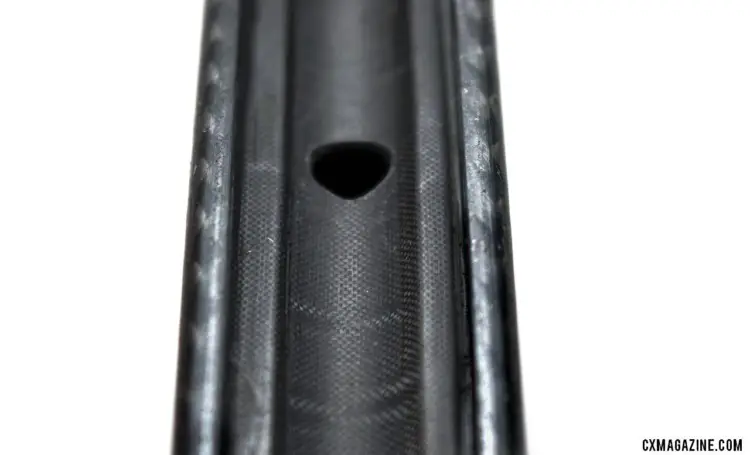
This is the only hole in the rim when you opt for the $100 no spoke hole option. The weight gain is lighter than tubeless tape and eliminates tape issues at the expense of easy nipple replacement. It’s worth noting that despite tough riding, we haven’t broken a spoke. FSE (Filament Spin Evolution) EVO 35CD carbon tubeless clincher disc brake wheels. © Cyclocross Magazine
The proof is in riding, and that’s where the FSE EVO 35CD tubeless wheels have shined. In a few months of use, they’ve remained completely true, handled impacts that would have dented an alloy rim and remained airtight.
What about the ride? Even in all-out-sprints, it’s hard to validate the company’s claim of 40% stiffer, and with just 24 spokes, we can’t say the 35CD wheels feel noticeably stiffer than other carbon wheels we’ve tested. Yet we’ve pushed the limits of low pressure tubeless setups, slammed the rim into curbs and rocks, and the rim looks no worse for wear and held the tire bead in place without a single burp.
The true test will be in the form of durability over time. Does the construction process result in a more durable rim that is less prone to failure due to impacts? Only time and hard riding will confirm this, but we’re trying our best to speed up the process.
These wheels really shine when you might least expect it: while doing maintenance. Need to swap a tire? You don’t have to worry about messing up your tubeless tape when removing or installing a tire. Need a lower gear for that hilly gravel race? The cassette comes off easily thanks to the steel bite guard. While these wheels haven’t seen a ton of mud, the bearings still spin as if they’re new despite a handful of power washes.
Speaking of maintenance, you might worry about how to replace a nipple if disaster strikes after a run-in with a competitor’s pedal resulting in a broken spoke and damaged nipple, but the repair is not quite as complicated as you might think. A nipple, small spoke remnant and a magnet might add five minutes to the process but should keep you from shipping them back. FSE has a video of the build process here.
The Early Verdict
For tubeless cyclocross use, the FSE EVO 35CD impresses with a nice balance of tubeless performance, weight savings, features and value. The rim is the selling point, and so far, has delivered reliable, worry-free performance we’d expect from a wheelset to be used both in training and racing.
The wheels may not boast the lightest rim, or the widest width, making weight weenies or fat tire gravel specialists look elsewhere for their numerical fix. [Update: FSE has a new, just-released gravel rim/wheelset, with hookless 26mm (internal) width rims that are even lighter than our test EVO 35CD rims.]
We’re anxious to see how these EVO 35CD test wheels hold up over time, and it’s no coincidence they’ve been finding their way onto several of our review bikes recently.
Stay tuned for our complete long-term review of the FSE EVO 35CD tubeless clincher wheels.
FSE EVO 35CD Tubeless Clincher Disc Brake Specifications
Price: $1,345
Weight: 452g rim (average, actual), 670g front, 780g rear, 1,450g wheelset (actual)
Rim Width: 26.65mm external, 18mm internal
Spokes: Sapim CX-Ray
Nipples: Sapim SILS Nipples Polyax 14mm, Black
Hubset: FSE 420, 24 spokes, front and rear
Cassette Body: Shimano/SRAM 11-speed, Campagnolo 10/11-speed
Axle: quick release; 12 and 15mm thru-axles; additional end caps available
More info: fse.bike
Brandon Grant contributed to this report.
Photo Gallery: FSE EVO 35CD Wheels











